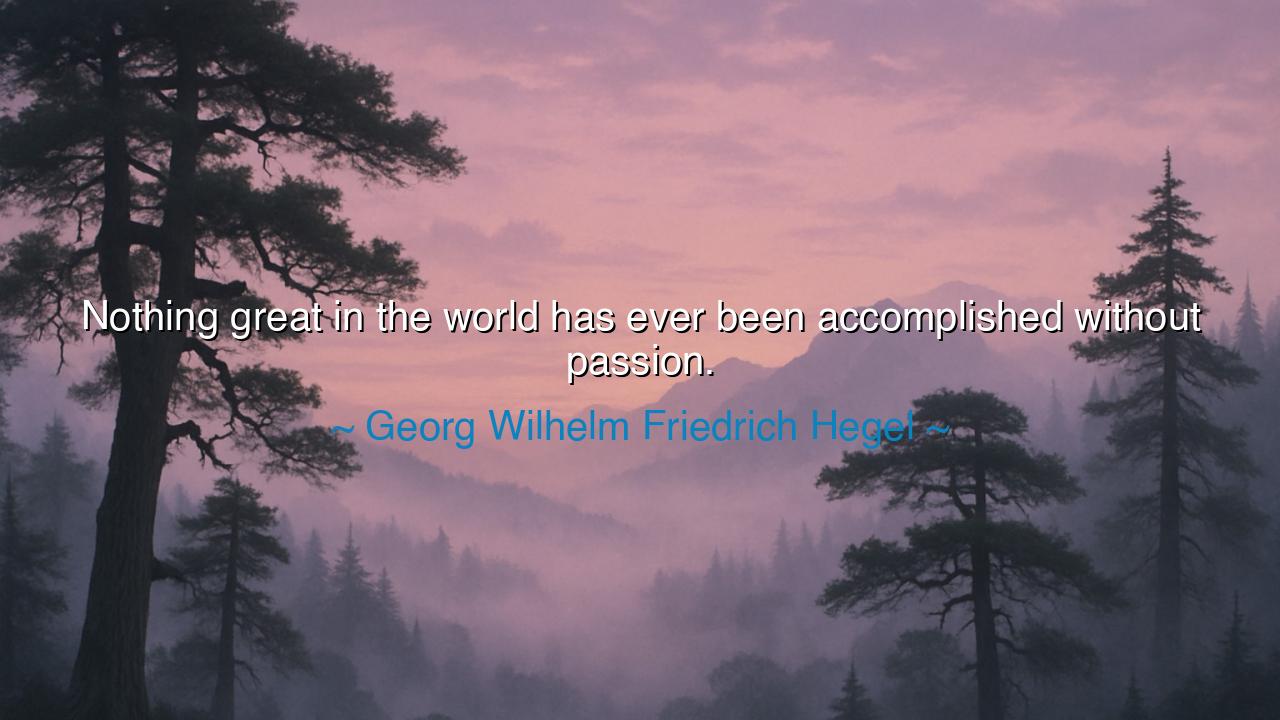
Nothing great in the world has ever been accomplished without






"Nothing great in the world has ever been accomplished without passion." — Georg Wilhelm Friedrich Hegel
In this mighty declaration, Georg Wilhelm Friedrich Hegel, the great philosopher of spirit and history, speaks of the divine fire that drives all creation: passion. His words resound like a timeless drumbeat, echoing through the corridors of every human age. He reminds us that reason may design, intellect may plan, but only passion gives life its power. Without that sacred flame within the heart, no work of art, no act of courage, no movement of progress could ever come to be. Passion is the force that awakens the sleeping soul—it is the breath that transforms thought into action and dream into destiny.
The origin of this quote is found in Hegel’s reflections on the history of humanity. In his Lectures on the Philosophy of History, he examined the great movements and revolutions that shaped civilization, and he observed that behind every monumental act stood not mere logic or duty, but a burning desire—an inner compulsion that moved individuals to shape the world. Passion, to Hegel, was not blind emotion; it was the focused fire of purpose, the will to give oneself wholly to an ideal. He saw that even the greatest leaders and thinkers—though guided by reason—were propelled by this inner flame, without which their vision would remain but an empty shadow.
To understand Hegel’s truth, one must see that passion is the soul’s energy, the sacred storm that drives both creation and transformation. It is the heartbeat of the artist who toils through the night to perfect his masterpiece; the steady fire of the scientist who endures failure after failure in pursuit of discovery; the courage of the reformer who stands alone against injustice. The greatest accomplishments of humankind have always sprung from hearts ablaze. Without passion, the pyramids would still be sand, the symphonies silent, the stars unexplored. For it is not comfort that births greatness—it is devotion, even to the point of sacrifice.
Consider the story of Ludwig van Beethoven, Hegel’s contemporary and fellow son of Germany. Deafened by fate, Beethoven could no longer hear the music that had once filled his world. Many would have surrendered to despair, but not he. His passion burned too fiercely. Though silence surrounded him, he continued to compose, guided by the echo of music within his soul. Out of his suffering was born the Ninth Symphony—a hymn to joy written by a man who could not hear. This, Hegel would say, is the proof of his truth: that nothing great is ever achieved without passion, for only passion can defy impossibility.
But passion alone is not chaos; it must be harnessed, as lightning is drawn through wire to create light. The ancients knew this. The Greeks spoke of thymos, the spirited energy that gives courage to the warrior and resolve to the thinker. Yet they also warned that passion without wisdom leads to ruin. Thus, the wise do not extinguish their fire—they master it. They let passion be their engine, not their tyrant. For unbridled passion may consume, but directed passion illuminates the world. The philosopher and the hero are kin, for both act not from indifference, but from the irresistible need to serve what they love.
Throughout the ages, the world has been shaped by those who burned with purpose. Galileo, who faced the wrath of his age to defend truth; Florence Nightingale, who turned compassion into the science of healing; Nelson Mandela, whose unbroken spirit outlasted decades of darkness. Each of these souls was guided not merely by reason, but by passion—the will to make meaning out of struggle. It is this force, invisible yet unyielding, that moves history forward and transforms suffering into legacy.
So, my child of the future, take this wisdom from Hegel and carry it as a flame within your heart: let passion be your compass. Whatever you do, do it with fire. Whether your calling is humble or grand, pour yourself into it as if the world depends upon your devotion—for in some small way, it does. The cold mind calculates, but the warm heart creates. Dare to feel deeply, to strive boldly, to care fiercely. For as Hegel teaches, it is passion alone that gives life its greatness, and those who live without it will never touch the eternal. The world belongs not to the cautious, but to the passionate—to those whose hearts burn brighter than the darkness they face.






AAdministratorAdministrator
Welcome, honored guests. Please leave a comment, we will respond soon